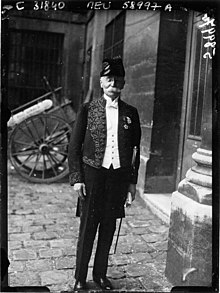Émile Mâle
Émile Mâle (born June 2, 1862 in Commentry , Département Allier , † October 6, 1954 in Fontaine-Chaalis , Département Oise ) was a French art historian .
Life
In 1899 Mâle completed his studies at the École normal supérieure with his dissertation L'art religieux du XIIIe siècle en France . From 1906 he taught at the Sorbonne , where he took over the chair for art history in 1912. In 1923 Mâle was appointed to succeed Louis Duchesne as head of the École française in the Villa Medici in Rome . Mâle held this post until 1937 when he returned to France. In 1927 he was elected to succeed Jean Richepin in the Académie française (Fauteuil 2). After his death in 1954, François Albert-Buisson took his place there.
Memberships
Émile Mâle was a member of
- Académie des Inscriptions et Belles-Lettres
- Académie française
- Royal Academy of Sciences and Fine Arts of Belgium
- Royal Academy of Arts
- British Academy
Honors
Émile Mâle was Grand Officier of the Legion of Honor
Works (selection)
- Emile Mâle: Studies on German Art . Edited by Otto Grautoff with replies from Paul Clemen , Kurt Gerstenberg , Adolf Göze, Cornelius Gurlitt , Arthur Haseloff , Rudolf Kautzsch , HA Schmid, Josef Strzygowski , Géza Supka, Oskar Wulff. Leipzig 1917
- L'art religieux du XIIe siècle en France. Étude sur les origines de l'iconographie du moyen age. Colin, Paris 1922.
- Jean Bourdichon. Les heures d'Anne de Bretagne. Bibliothèque Nationale. (Latin manuscript 9474) (= Verve. Vol. 4, = 14/15, 1946, ISSN 1145-8720 ). Texts by Émile Mâle. Legend by Edmond Pognon . Verve, Paris 1946.
- Notre-Dame de Chartres. Photographies de Pierre Devinoy. Hartmann, Paris 1948.
Web links
- Literature by and about Émile Mâle in the catalog of the German National Library
- Short biography and list of works of the Académie française (French)
Individual evidence
- ↑ Mâle, Émile ( Memento of October 3, 2006 in the Internet Archive )
- ^ Deceased Fellows. British Academy, accessed July 3, 2020 .
- ^ List of members of the Académie française
| personal data | |
|---|---|
| SURNAME | Mâle, Émile |
| BRIEF DESCRIPTION | French art critic |
| DATE OF BIRTH | June 2, 1862 |
| PLACE OF BIRTH | Commentry |
| DATE OF DEATH | October 6, 1954 |
| Place of death | Fontaine-Chaalis |
